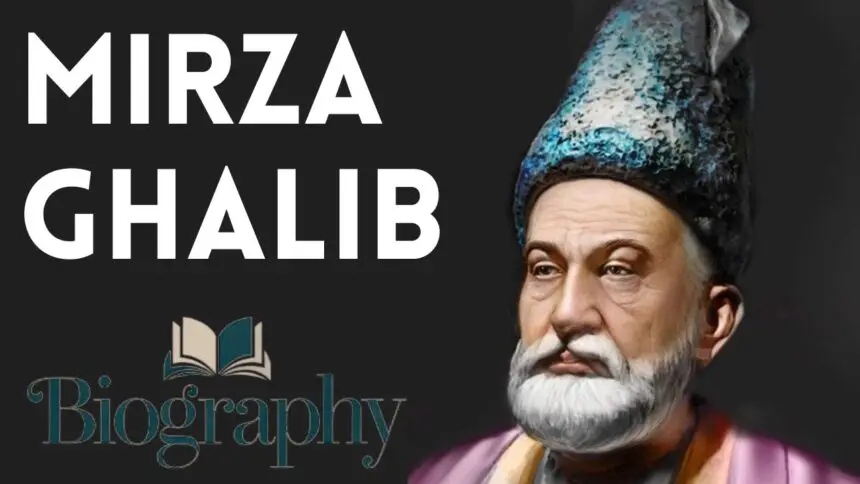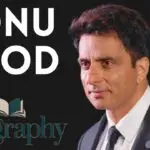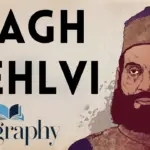Mirza Ghalib Biography: The Life and Legacy of the Legendary Poet
Mirza Ghalib, one of the greatest poets of the Mughal era, remains an enduring icon of Urdu and Persian literature. His poetry, rich with deep emotions, philosophy, and wit, continues to inspire generations. This Mirza Ghalib biography will explore his early life, struggles, literary contributions, and legacy.
Early Life and Background
Born as Mirza Asadullah Baig Khan on 27 December 1797, in Agra, India, Ghalib belonged to a family of Turkish descent. His father, Abdullah Beg, was a military officer, but he passed away when Ghalib was just five years old. Following his father’s demise, Ghalib was raised by his uncle, Mirza Nasrullah Baig Khan, who also died when Ghalib was still a child. These early losses had a profound impact on his life and later influenced his poetry.
Marriage and Personal Life
At the tender age of 13, Mirza Ghalib was married to Umrao Begum, the daughter of Nawab Ilahi Bakhsh. Despite being married, Ghalib led a bohemian lifestyle, indulging in gambling, alcohol, and social gatherings. He never had children, and the pain of this loss is often reflected in his poetry.
Mirza Ghalib’s Poetry and Literary Career
Mirza Ghalib was a master of Urdu and Persian poetry, and his verses were characterized by their depth, melancholy, and philosophical themes. His ghazals remain some of the finest in Urdu literature. Unlike his contemporaries, Ghalib’s poetry did not simply focus on romantic love but explored existential themes, human struggles, and divine mysteries.
Mirza Ghalib’s Major Works
- Diwan-e-Ghalib – A collection of his Urdu ghazals, which remains his most celebrated work.
- Odes in Persian – Ghalib considered his Persian poetry superior to his Urdu work.
- Letters of Ghalib – His letters, written in simple yet poetic Urdu, offer deep insights into his thoughts and times.
Famous Ghazals by Mirza Ghalib
20 famous couplets (Sher) by the legendary Urdu poet Mirza Ghalib
- Hazaron khwahishen aisi ke har khwahish pe dam nikle
Bahut nikle mere armaan lekin phir bhi kam nikle
(Thousands of desires, each so strong that it takes my life.
Many desires were fulfilled, yet they were still too few.) - Dil hi to hai na sang-o-khisht dard se bhar na aaye kyon
Roohen se chhupaye na chhupaye na aaye kyon
(It’s just a heart, not a stone wall; why shouldn’t it be filled with pain?
Whether hidden in the soul or not, why shouldn’t it come?) - Na tha kuch toh kuch bhi nahi tha
Ab kuch hai toh kuch bhi nahi hai
(When there was nothing, there was absolutely nothing;
Now that something is there, still it feels like nothing.) - Yeh na thi hamari qismat ke visal-e-yaar hota
Agar aur jeete rehte, yahi intezaar hota
(It was not in my destiny that I would meet my beloved.
Had I lived longer, it would have been just this waiting.) - Ishq par zor nahi hai, yeh woh aatish Ghalib
Ke lagaye na lage, aur bujhaye na bane
(Love cannot be forced; it is a fire, Ghalib,
Which can’t be lit at will, nor extinguished at ease.) - Bazicha-e-atfal hai duniya mere aage
Thodi der ke liye tu mujhko dekh le
(The world is like a children’s playground before me,
Just take a look at me for a while.) - Jab ke tum hi na paaye the to kis baat ka gham hai
Khush ho ke tumko dekh le, yaad kar le
(When you couldn’t find me, then what sorrow is there?
Be happy that you saw me, or remember me.) - Jab naach ne se mohabbat thi, toh shaam-e-gham ho gayi
Dil ko mil gaya, yeh bhi na tha ho gayi
(When there was love in dancing, the evening became sorrowful,
The heart found what it was searching for, but still, it was not enough.) - Dil-e-naadaan tujhe hua kya hai
Akir tere hisse ki ye dua kya hai
(O innocent heart, what has happened to you?
Finally, what is this prayer for you?) - Har ek baat pe kehte ho tum ke tu kya hai
Tumhi kaho ke tumhi ke saath ho ke tum kya hai
(You say at every moment, what are you?
Say yourself, what is your identity?) - Gham-e-ishq ne hamare jeene na diya
Na jeene diya na marne diya
(The sorrow of love did not let me live,
Neither did it let me live nor die.) - Na tha kuch toh kuch bhi nahi tha
Ab kuch hai toh kuch bhi nahi hai
(When there was nothing, there was absolutely nothing;
Now that something is there, still it feels like nothing.) - Jab naach-ne se mohabbat thi, toh shaam-e-gham ho gayi
Dil ko mil gaya, yeh bhi na tha ho gayi
(When there was love in dancing, the evening became sorrowful,
The heart found what it was searching for, but still, it was not enough.) - Jab se humne dekha hai, aapko
Zindagi ne humko ik naya saaf diya hai
(Since I saw you,
Life has granted me a fresh breath.) - Mujhe tum yaad karte ho, toh sab kuch roshan hota hai
Hamaari saari khushbu ke saath ho jata hai
(When you remember me, everything becomes illuminated,
All our fragrances together come alive.) - Rang-e-chaman hai waise bhi, jo kisise yeh badhai hai
Phir kuch yeh asar nahi, ke kuch bhi nahi badla hai
(The beauty of the garden is the same, even if someone compliments it,
Then there’s no effect, nothing has changed.) - Tumhen dekha toh yeh laga
Zindagi mein mujhko koi nahi milta hai
(When I saw you, it seemed,
In my life, no one else could be found.) - Kehte hain ke gham ke karan chhupte hai sab kuch
Hum toh kuch bhi nahi chhupte, sab kuch jeene ki hai
(They say everything hides because of sorrow,
But we don’t hide anything, everything is for living.) - Bhi dikhi hai, waqt ke surkh badal dikhaye
Hamaari chand se raaste ki raah dikhaye
(The moments have shown, the red clouds of time,
They revealed the path of the moon’s journey.) - Pehli si mohabbat ki yaad nahi hai
Duniya ko humne thoda samjhaya hai
(I don’t remember the first love,
I taught the world a little about love.)
Mirza Ghalib and the Mughal Court
During his lifetime, Ghalib witnessed the decline of the Mughal Empire. He was appointed as the poet laureate in the court of the last Mughal emperor, Bahadur Shah Zafar. Despite his royal connections, he struggled financially and was often at odds with the British administration.
Mirza Ghalib’s Struggles and Later Life
Despite his immense talent, Mirza Ghalib did not receive the financial success he deserved. His lavish lifestyle, coupled with his love for gambling and alcohol, led to financial difficulties. Moreover, his modern and philosophical style of poetry was not always appreciated by traditional scholars of the time.
In his later years, Ghalib witnessed the Indian Rebellion of 1857, which led to the downfall of the Mughal Empire. The British crackdown on Delhi and its poets left Ghalib in despair. His later poetry reflects his sorrow over the destruction of his beloved city.
Death and Legacy
Mirza Ghalib passed away on 15 February 1869, in Delhi, leaving behind a rich literary heritage. Even after more than 150 years, his poetry remains relevant. His verses continue to be quoted in films, literature, and everyday conversations.
Why Mirza Ghalib is Still Relevant Today?
- Universal Themes – His poetry covers love, loss, philosophy, and mysticism, making it timeless.
- Influence on Music and Cinema – Many of his ghazals have been adapted into songs and Bollywood films.
- Inspirational Figure – Writers, poets, and artists continue to draw inspiration from his work.
Mirza Ghalib Biography in Popular Culture
Ghalib’s life has been the subject of many books, TV shows, and films. The famous Doordarshan TV series “Mirza Ghalib” (1988) starring Naseeruddin Shah brought his story to a new generation. His poetry is still recited in literary gatherings worldwide.
Conclusion
This Mirza Ghalib biography highlights the extraordinary journey of a poet whose words transcend time. His ghazals, filled with wisdom and beauty, ensure that he remains one of the greatest literary figures in history. Whether you are a poetry lover or a newcomer, Mirza Ghalib’s biography offers a glimpse into the life of a genius whose legacy will never fade.



